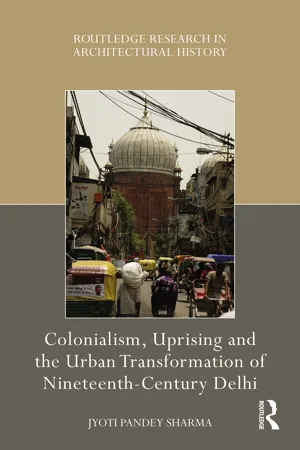
Colonialism, Uprising and the Urban Transformation of Nineteenth-Century Delhi
- 210 pages
- English
- ePUB (mobile friendly)
- Available on iOS & Android
Colonialism, Uprising and the Urban Transformation of Nineteenth-Century Delhi
About This Book
No other city in the Indian subcontinent can lay claim to having so many lives as Delhi. This book examines Delhi in the politically and culturally dynamic nineteenth century which was marked midway by the 1857 uprising against British colonial rule as a watershed event. Following British occupation, Delhi became a receptacle for encounters between the centuries-old Mughal traditions and the incoming colonial ideal, producing a traditionalism-modernity binary. Employing the built environment lens, the book traces the architectural trajectory of Delhi as it transitioned from the seventeenth-century Mughal Badshahi Shahar (imperial city) first into a culturally hybrid Dilli-Delhi combine of the pre-uprising era and thereafter into a modern British city following the uprising. This transition is presented via four constructs that draw on the traditionalism-modernity binary of Mughal and British Delhi and include Marhoom Dilli (Dead Delhi); Picturesque Delhi; Baaghi Dilli (Insurgent Delhi) and Tamed Delhi. The book goes beyond the nineteenth century to examine the vestiges of Delhi's four nineteenth-century lives in the present while making a case for their acknowledgement as a cultural asset that can propel the city's urban development agenda. By bringing together the city's past and its present as well as addressing its future, the book can count among its readers not just scholars but also those interested in cities and their evolving landscapes.
Frequently asked questions
Information
Table of contents
- Cover
- Half Title
- Series Page
- Title Page
- Copyright Page
- Dedication
- Contents
- List of Illustrations Credits
- Acknowledgements
- List of Abbreviations
- Glossary
- 1 Introduction: Delhi in the ‘Long Nineteenth Century’
- 2 Mughal Badshahi Shahar: Shahjahanabad
- 3 Marhoom Dilli (Dead Delhi): Fashioning a new identity
- 4 Picturesque Delhi: Ruins and leisurely pursuits
- 5 Baaghi Dilli (Insurgent Delhi): Constructing heroes and villains
- 6 Tamed Delhi: Spatial tyranny and the weaponry of exclusion
- 7 Twentieth-Century Delhis: New Delhi versus Old Delhi
- 8 Epilogue: The future of Delhi's past
- Index